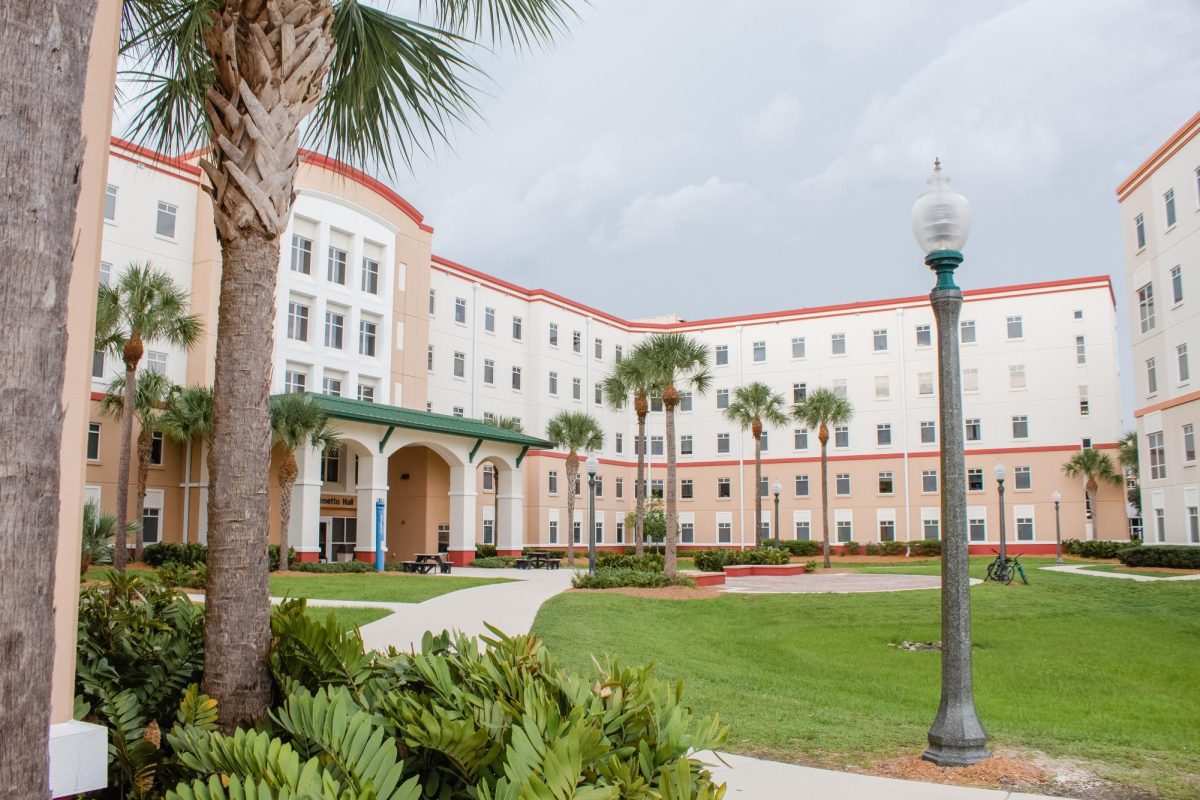The FGCU Board of Trustees voted unanimously to increase rent for on-campus housing for the first time in 10 years on Tuesday, Sept. 12. Housing rates will be increased by 5% each year for the next four years, beginning in fall of 2024. This means rent will be increased by a total of 20% by 2028 compared to current fees.
“I wanted to let them know that it wasn’t an easy vote for me, because to me, it is important to provide affordable housing for our students. For the record it wasn’t an easy vote for any of us, but we know it is important to have our assets in a quality way to serve our students in the best possible way,” President Aysegul Timur said at the Board of Trustees meeting.
At FGCU’s Housing & Residence Life town hall on Sept. 11, Assistant Vice President of university housing Jameson Moschella explained the reasoning for this increase.
“Last year a company named Gordian Capital Planning was engaged to provide the university a comprehensive (housing) facility assessment. The cash analysis showed that the FGCU Financing Corp would be in debt by fiscal year 2027 if there were no rate increase,” Moschella said. “This decision was not made lightly, but economic realities and maintenance needs must be managed.”
He then explained that the FGCU Financing Corporation will run out of unrestricted cash by fiscal year 2027 and be in debt of around $20,000,000 by fiscal year 2030 if raises are not made.
The FGCU Financing Corporation is the entity that finances FGCU Housing & Residence Life. They oversee the financing for construction of housing and deal with the bonds and mortgages taken out.
Moschella said significant upgrades and improvements have been made to the buildings over the past 10 years, including the $30,000,000 that has been put back into the facilities through new and renovated mechanics, electrical, plumbing, appliances and flooring.
“North Lake Village is currently projected to have 69% of project expenses in the next 10 years, with West Lake having 10% and South Village having 21% of project expenses,” he said. “$102,969,253 is projected to be spent on 2,354 projects over the next ten years.”
The main reason North Lake Village is receiving a majority of the repairs is due to its age, having been founded in 1996. It is scheduled to begin receiving roof repairs starting this semester.
In the past, FGCU Housing & Residence Life has increased its rate by 5.7% from 2006-2010 and 1% in 2012. FGCU has not increased on-campus rental fees since 2013.
Another cause of the increase is partly due to inflation.
“To get vendors to put things like air conditioner units in has gone up in the past, and everything has gone up in money in the past three years,” Moschella said.
Compared to other state universities, FGCU has the least expensive housing. The closest in price is Florida International University, whose $4,900 two-bed double is still $80 more expensive than FGCU.
“Compared to other schools, everybody costs more than us,” Moschella said.
According to a PowerPoint presented at the Board of Trustees meeting, the rate of increase if students pay by installment in fiscal year 2025 would be $318 for South Village, $295 for North Lake Village and $362 for West Lake Village each month.
The Board of Trustees PowerPoint stated that when the rate hikes stop in fiscal year 2028, the cost of South Village will be $7,731, North Lake $7,167 and West Lake, $8,790.
Currently, the only state universities that have not increased their housing rent are Florida International University, Florida Atlantic University, Florida A&M University and New College of Florida. All other schools in the system are planning to have an increase in fiscal year 2024 from 4% to 4.5%.
“I do believe that putting in this housing rental increase will help us in the future. For a young institution like ours, not raising rental increases in ten years was a good thing, but as time passes and the economy changes, there are higher standards that the university has to uphold,” Jakira Bryan, Director of Administration and Finance for the Resident Housing Association, said. “Even though it may not seem like it right now, I think this is the best plan that will put in actual efforts to decrease housing in the future.”
According to the Housing & Residence Life website, currently 80% of freshmen live on campus. Thirty-three percent of all undergraduates live on campus according to data provided by the Board of Trustees. The other 20% of freshmen live off campus in private apartments like The Reef, Coastal Village or with their families.
The rent for a four bed, four bath apartment at Coastal Village is $735 a month, and is $930 a month at The Reef. University Village is the most expensive, costing $975 a month for a four bed, four bath apartment. Utilities aren’t included in off-campus housing. In this rental market, the rent in the past five years has gone up by 24%.
Student Government President Emory Cavin spoke about his decision to vote in favor of the bill.
“I know that there are a lot of students who see this and wonder why I am going to vote on this in the way that I am […] This is not an easy choice for me. I understand that there are students that are on the margin who are not going to be able to afford this raise in housing. Since we are the cheapest form of housing in the area, this weighs very heavily on me, but I truly believe that we have one of the best housing programs in the country and certainly the region,” Cavin said. “I believe that if we were to vote this down, we would no longer have one of the best housing programs, and that it would be a disservice to future student bodies to no longer have access to the program that we have had access to.”




























